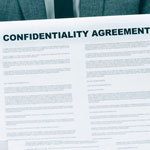The New Jersey Earned Sick Leave Act (the “Act”) took effect in October 2018. Here’s what employers need to know:
- The Act applies to all employers, regardless of size.
- All employees, including part-time employees and exempt employees, are eligible for earned sick leave under the Act.
- Earned sick leave may be used for any one or more of the following purposes:
- Diagnosis, care (including preventive care), treatment of, or recovery from an employee’s mental or physical illness, injury or other adverse health condition, or that of an employee’s family member.
- Absence of an employee to enable the employee, or a family member of the employee, (i) to obtain, for the employee or family member, medical attention to recover from physical or psychological injury or disability caused by domestic or sexual violence; (ii) to utilize services from a designated domestic violence agency or other victim services organization to address issues arising as a result of domestic or sexual violence; (iii) for psychological counseling; (iv) to facilitate relocation; or (v) to obtain legal services, including for the purpose of securing a restraining order or preparing for, or participating in, any civil or criminal proceeding related to the domestic or sexual violence.
- Time during which an employee is not able to work because of (i) the closure of the employee’s workplace, or the school or childcare facility of a child of the employee, by order of a public official due to an epidemic or other public health emergency; or (ii) because of a determination that the presence of an employee or a family member of the employee in the community would jeopardize the health of others.
- Time needed by an employee to attend (i) a school-related conference, meeting, function or other event requested or required by a school administrator, teacher or other professional responsible for the education of the employee’s child; or (ii) a meeting in connection with the child’s health condition or disability.
- Employers have two options with regard to sick leave accrual, to (a) require employees to accrue paid sick leave at the rate of one hour for each 30 hours of work, up to 40 hours in a benefit year; or (b) front-load 40 hours of paid sick leave at the beginning of each benefit year. A “benefit year” is from January 1 to December 31. Employees begin to accrue earned sick leave on the date of hire, but must wait for 120 days after the date accrual to begin to use earned sick leave.
- An employer may elect to, at the end of a benefit year, (a) pay each employee an amount equal to the number of accrued but unused hours of earned sick leave, multiplied by the employee’s hourly base compensation computed on the basis of a 40-hour week; or (b) permit each employee to roll over accrued but unused paid sick leave into the new benefit year. Note, however, that that the maximum number of hours of paid sick leave that may be used in any benefit year is 40, regardless of the number of accrued hours of leave credited to an employee. Note as well that an employer may change its election to pay out or roll over unused sick leave prior to the start of any new benefit year.
- If an employee is separated from employment for any reason, the employer may, but is not required, to compensate the employee for accrued but unused sick leave. Accrued but unused sick leave must be restored to an employee who is rehired or reinstated within six months of the date of separation.
- Employees are required to provide at least 72 hours’ advance notice prior to the date leave is to begin where the need for leave is “foreseeable”. “Foreseeable” means that an employee can predict or know in advance when leave will be needed; for example, for a scheduled doctor visit or procedure, a regularly recurring medical treatment or regularly scheduled therapy appointment. Where the need for leave is foreseeable, employees must make a reasonable effort to schedule leave in a manner that does not unduly disrupt the operations of the employer. Where the need to use leave is foreseeable, an employer may prohibit employees from using earned sick leave on “certain dates,” such as high-volume periods, holiday periods or special events. Employees who seek to use earned sick leave on certain dates may be required to provide reasonable documentation of need.
Employers are encouraged to notify their employees of the respective rights of the employer and its employees under the Act in writing, and to secure an employee’s signature acknowledging that he or she has been so informed.
A sample acknowledgement follows:
Please indicate that you have received a copy of this memorandum by signing and dating this page in the space provided. Make a copy of the signed memorandum for your records, and return a signed copy to.
______________________________
Print name
______________________________ Date: _________________________
Employee Signature







 New Jersey Bans Salary History
New Jersey Bans Salary History New Jersey’s Paid Sick Leave Act: It’s Complicated, and It Covers More Than Sick Leave
New Jersey’s Paid Sick Leave Act: It’s Complicated, and It Covers More Than Sick Leave In California, Misclassifying Employees Just Got Harder.
In California, Misclassifying Employees Just Got Harder. A #MeToo Moment for New Jersey Employers?
A #MeToo Moment for New Jersey Employers? Employee or Independent Contractor?
Employee or Independent Contractor?
Leave a Reply